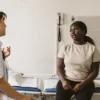RALEIGH, N.C. – According to the Centers for Disease Control and Prevention, Black women are three times more likely to die from a pregnancy related cause than white women.
Wednesday is the final day of Black Maternal Health Week, which is recognized every year from April 11 to 17. It’s a way to raise awareness about that inequity and improve Black maternal health in the future.
The CDC says that disparity in maternal health outcomes can be due to variation in quality of health care, underlying chronic conditions as well as structural racism and implicit bias in the health care system.
Jekisha Elliot has been a birth doula for about three years now and runs Jendayi Doula Services.
“What can we do to make this a comfortable journey for you so that you have a great birthing experience,” Elliott said.
Elliott often incorporates yoga and stretching into her clients’ services.
“That will really help to open up your hips as well,” Elliott said.
As a birth doula, she helps women and families on their reproductive journeys.
“Having a doula helps to reduce the risk of a C-section. It reduces the amount of labor by 41 minutes. It also increases your chances of breastfeeding successfully. So these are all things that have been studied and have been proven,” Elliott said.
She’s always been passionate about serving others, and this work also allows her to advocate for people during a life changing chapter.
“This is a really special moment. It’s an intimate moment. And so, just being able to be with families during this time where a lot of people don’t get to experience that,” Elliott said.
For Elliott, health care isn’t a one size fits all type of situation.
“A lot of doctors, they get training and things like that but life is changing. The world is changing. I think we all have to be aware of people’s culture and things they would like,” Elliott said.
When it comes to childbirth, she says she’s seen the impact a narrow approach can have, especially on marginalized communities.
Jekisha Elliott helps guide a client during some stretching exercises. (Spectrum News 1/Kyleigh Panetta)
“A lot of times women, especially women of color, have to advocate for themselves because our concerns are not heard. They’re dismissed. There’s many Black women who have lost their lives either before, during or after childbirth just because their concerns weren’t heard,” Elliott said. “They want to see someone in the room with them that looks like them and that can help advocate for them and encourage them to feel strong through this journey.”
She believes as more people learn what doulas can offer, and as more insurance companies cover these types of services, it’ll only improve birth outcomes for women and children of all backgrounds.
“We just need to have more of a movement behind it so that it’s pretty much equitable for everybody. It doesn’t just matter that it’s affecting the African American, the Black and brown community. This should be an issue for everyone,” Elliott said.
According to the CDC, 80% of pregnancy related deaths in the United States are preventable, and there are things that can be done to change that number beyond expanding access to health care resources like doulas. The CDC says identifying and addressing social factors that influence maternal health can improve birth outcomes. That includes things like unstable housing, transportation access, food insecurity, substance use and violence among others.
The CDC is also working to promote its “Hear Her” campaign to raise awareness about the potentially life-threatening warning signs during and after pregnancy as well as improve communication between patients and their doctors.


